Mohs Surgery for Skin Cancer
Vickery Meadow Dallas, TX
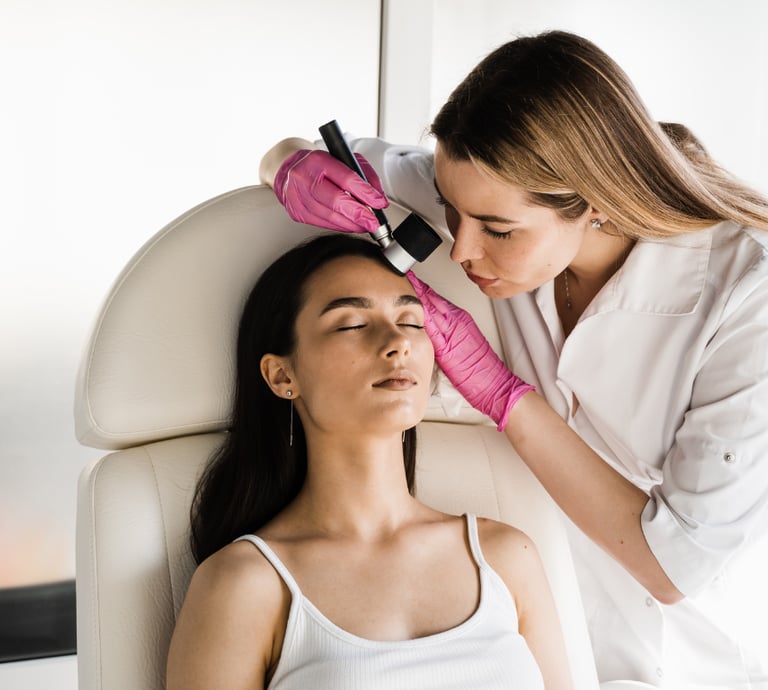

Healthy Skin Starts with Expert Care. Trust Mohs Surgery for Precision and Radiance.
Your Skin Deserves the Best Care. Experience Precision and Excellence with Mohs Surgery Today!
Expert Mohs Surgery Vickery Meadow Dallas
Precision Care for Healthy Skin
Looking for a Trusted Mohs Surgeon Near Vickery Meadow Dallas?
If you're seeking a highly effective and precise treatment for skin cancer, Mohs surgery may be the ideal solution. This advanced technique is designed to remove cancerous cells layer by layer, preserving as much healthy tissue as possible for optimal cosmetic and medical results. Whether you're facing basal cell carcinoma, squamous cell carcinoma, or another type of skin cancer, our experienced specialists serving the Vickery Meadow area provide personalized care tailored to your specific needs.
From your initial consultation through every stage of recovery, our compassionate team is here to guide and support you—ensuring the best possible outcome for your skin health. Don’t wait to take charge of your care. Contact us today to learn how Mohs surgery can help protect your health and restore your confidence.
Mohs surgery, developed by Dr. Frederic E. Mohs in the 1930s, is an advanced, precision-based technique for removing skin cancer while preserving as much healthy tissue as possible. It allows doctors to examine the tissue under a microscope right away to make sure all the cancer, including any hidden roots, is completely removed. Because of this, Mohs surgery has the highest cure rate for skin cancer and removes as little healthy tissue as possible, which helps reduce scarring.
Some skin cancers may look small but can actually spread deeper into the skin, following blood vessels, cartilage, or nerves. Mohs surgery is designed to find and remove these hidden cancer roots, making it an effective and precise treatment option.
Overview of the Procedure
Mohs surgery is a highly precise and effective procedure for removing skin cancer, especially in areas where conserving healthy tissue is critical. During the procedure, the surgeon removes thin layers of cancerous tissue one at a time, examining each layer under a microscope to ensure all cancer cells are gone. This method allows for the complete removal of cancer while minimizing damage to surrounding healthy skin, making it ideal for sensitive areas such as the face, ears, and hands.
Benefits of Mohs Surgery
Mohs surgery offers several key advantages:
High success rate: With its layer-by-layer approach, Mohs surgery boasts a high cure rate, especially for skin cancers that have a tendency to recur.
Minimal tissue removal: The precision of the surgery means that healthy tissue is preserved, leading to better cosmetic outcomes.
Faster recovery: Because the surgery is so targeted, recovery is typically quicker than other methods of skin cancer removal.
Cost-effective: While Mohs surgery may seem more expensive initially, it often reduces the need for further treatments and re-excisions, ultimately lowering long-term costs.
Conditions Treated
Mohs surgery is primarily used to treat non-melanoma skin cancers, including:
Basal cell carcinoma: The most common type of skin cancer, often found on sun-exposed areas.
Squamous cell carcinoma: A type of skin cancer that can spread to other parts of the body if left untreated.
Melanoma: In certain cases, Mohs surgery may be used for melanoma, especially if it has recurred in a previously treated area.
Rare or aggressive skin cancers: Mohs is also effective for more unusual or aggressive skin cancers that are difficult to treat with traditional methods.
Mohs surgery ensures thorough removal of skin cancer with the goal of preventing further spread, while offering patients the highest chance of preserving their appearance and health.
What Is Mohs Surgery?
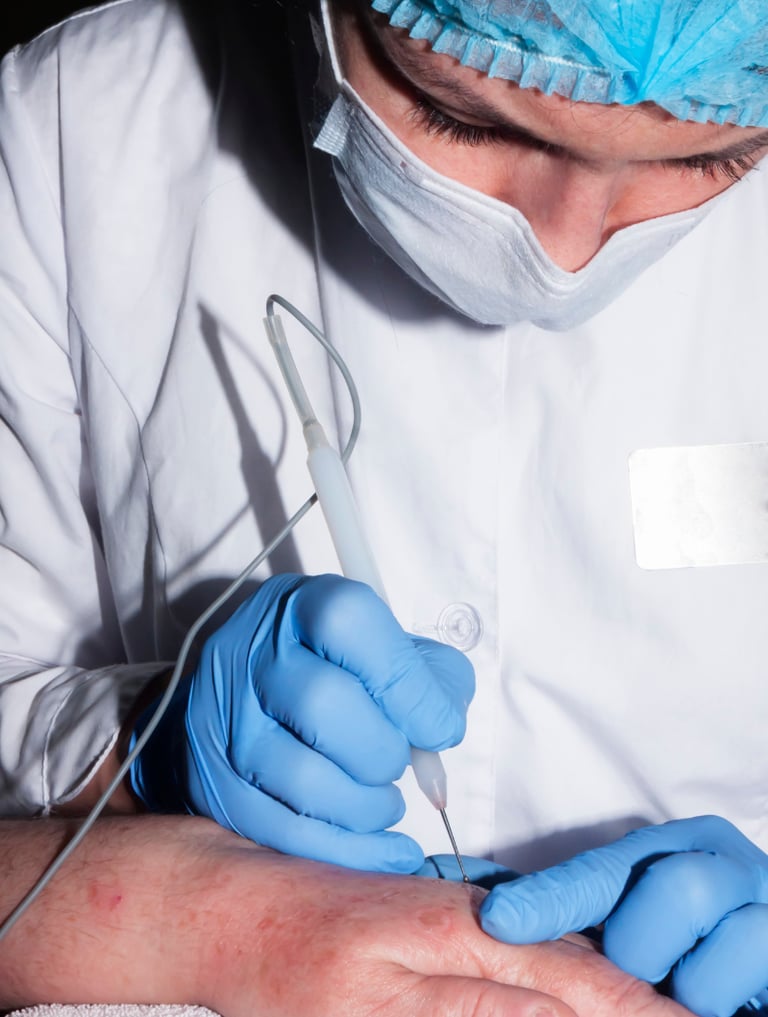

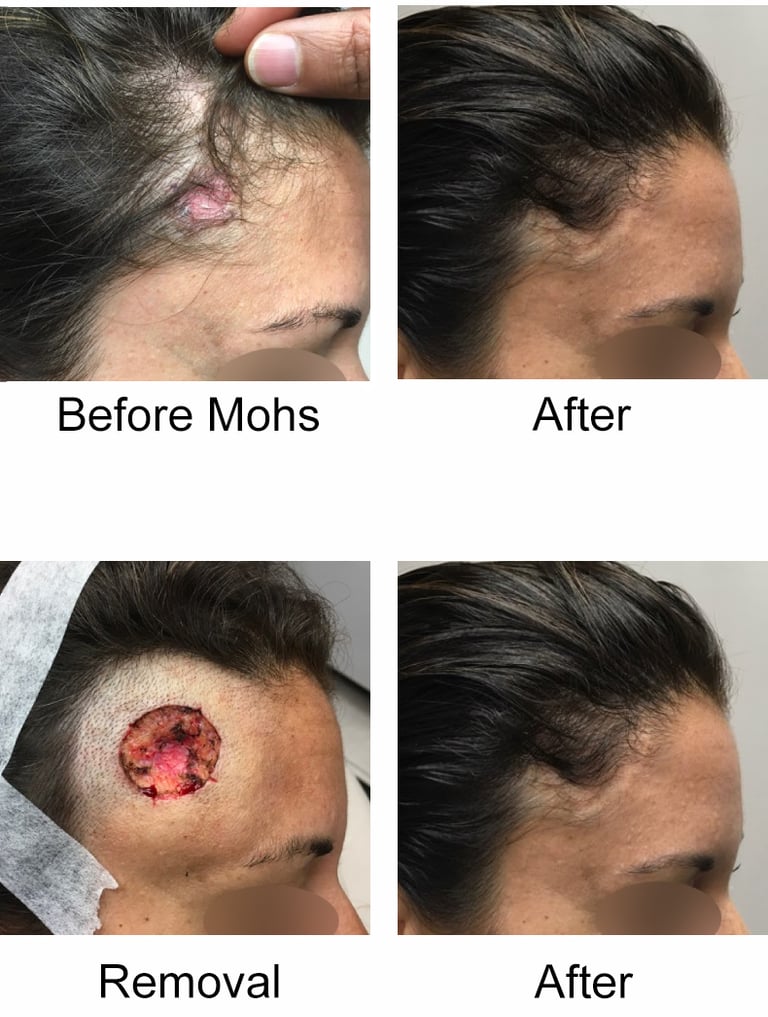

High Success Rate
Mohs surgery is considered the gold standard for treating certain types of skin cancer, offering an exceptionally high success rate. By carefully removing the cancerous tissue layer by layer and examining each layer under a microscope, this technique ensures that all cancer cells are removed. This approach leads to a lower recurrence rate compared to other surgical methods, giving patients confidence that their skin cancer is effectively treated. For many, Mohs surgery provides the highest likelihood of complete removal and long-term cancer-free results.
Precision and Minimal Tissue Removal
One of the primary advantages of Mohs surgery is its precision. The surgeon removes cancerous cells one thin layer at a time, ensuring that only the affected tissue is removed. This layer-by-layer method allows for maximum preservation of healthy skin and minimizes scarring, which is particularly important for surgeries on visible areas such as the face or neck. The minimal removal of tissue not only enhances cosmetic outcomes but also speeds up the healing process and reduces the likelihood of complications.
Faster Recovery
Because Mohs surgery is so targeted and minimizes the amount of tissue removed, recovery tends to be faster than other more invasive surgical methods. With less disruption to surrounding healthy tissue, patients typically experience less pain and swelling, leading to a quicker return to normal activities. Post-operative care is also more straightforward, and patients often find they need fewer follow-up treatments. The ability to preserve as much healthy skin as possible helps reduce recovery time, allowing patients to heal faster and enjoy better outcomes overall.
Why Choose Mohs Surgery?
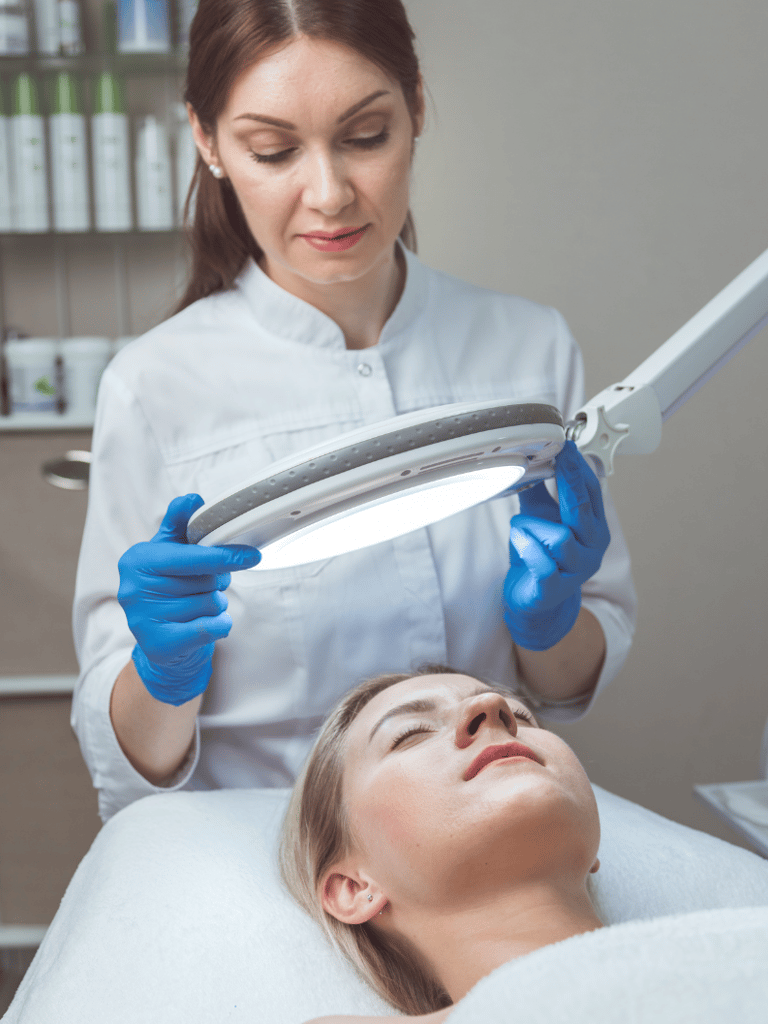

Mohs Surgery Process:
At our clinic Vickery Meadow, we specialize in expert Mohs surgery—a highly precise and effective treatment for skin cancer that preserves healthy tissue while ensuring complete removal. Whether you're dealing with basal cell carcinoma, squamous cell carcinoma, or other forms of skin cancer, our experienced dermatologists are committed to delivering the highest standard of care. Using advanced techniques and state-of-the-art technology, we ensure a thorough, minimally invasive approach with the best outcomes for your skin health. Read on to learn more about how Mohs surgery can offer you a safe, effective solution for skin cancer treatment, with a focus on preserving healthy tissue and achieving the best cosmetic results.
Pre-Surgery Consultation
The first step in the Mohs surgery process is the pre-surgery consultation, where the surgeon evaluates your skin cancer and discusses your medical history. During this consultation, the surgeon will assess the size, location, and type of skin cancer you have to determine if Mohs surgery is the best treatment option for you. The doctor will explain the procedure in detail, address any questions or concerns, and outline what to expect before, during, and after surgery. You may also be asked to discontinue certain medications or adjust your skincare routine in preparation for the surgery.
The Surgical Procedure
On the day of the surgery, the procedure begins with the application of local anesthesia to the treatment area, ensuring you are comfortable and pain-free throughout the process. The surgeon will then carefully remove a thin layer of skin containing the cancerous tissue. This tissue is sent to a lab where it is examined under a microscope to check for cancer cells. If any cancer remains, another layer is removed, and the process is repeated until all cancerous cells are eradicated. The precision of Mohs surgery ensures that only cancerous tissue is removed, preserving as much healthy skin as possible.
Once the cancer is fully removed, the surgeon will discuss your options for closing the wound. In many cases, the wound can be closed with stitches; however, if the area is too large, a skin graft or other reconstructive techniques may be necessary.
Post-Operative Care and Recovery
After your Mohs surgery, the recovery process begins. The surgeon will provide detailed instructions for caring for the surgical site, including how to clean the wound, apply ointments, and protect it from infection. You may experience some swelling, redness, and minor discomfort, but these symptoms should subside within a few days. Pain management options will be provided to ensure you are as comfortable as possible.
Follow-up appointments are typically scheduled within a few weeks to monitor healing and ensure that the wound is properly closing. In most cases, the recovery time is relatively short, and you will be able to resume normal activities within a week or two. The surgeon will continue to monitor your skin during follow-up visits to ensure there are no signs of cancer recurrence.
By following the post-operative instructions carefully, you can help ensure optimal healing and a smooth recovery process.
Who Is a Candidate for Mohs Surgery?
Mohs surgery is typically recommended for individuals diagnosed with specific types of skin cancer, particularly basal cell carcinoma (BCC) and squamous cell carcinoma (SCC), which are the two most common non-melanoma skin cancers. This procedure is ideal for cancers located in areas where preserving healthy tissue is critical, such as the face, neck, hands, ears, and scalp, or when the tumor has a high risk of recurrence. Mohs surgery is also favored for aggressive or large skin cancers, as well as for patients whose cancer has poorly defined borders that require meticulous removal. In cases of recurring skin cancers that may have been previously treated, Mohs provides a precise solution to ensure complete cancer removal while preserving as much healthy tissue as possible.
Candidates for Mohs surgery are often those who value both high cure rates and aesthetic outcomes, as the procedure minimizes scarring. Individuals who are immunocompromised, such as organ transplant recipients, or those with genetic predispositions to skin cancer (like Gorlin syndrome) may also benefit from this advanced treatment method. Consulting with a board-certified Mohs surgeon is the best way for patients to determine if they are suitable candidates. For residents in Vickery Meadow, local dermatology clinics offer evaluations to assess individual cases and provide personalized treatment plans, ensuring early and effective intervention.
Patient Suitability Criteria
While Mohs surgery is an effective option for many patients, not everyone with skin cancer is a candidate. The following factors are considered when determining suitability for Mohs surgery:
Location of the Cancer: Mohs surgery is ideal for cancers located in areas where cosmetic outcomes and tissue preservation are important, such as the face, ears, nose, and neck. It is also effective for cancers in areas that are difficult to treat with traditional excision.
Cancer Size and Depth: Mohs surgery is especially effective for larger or more aggressive skin cancers that have grown deep into the skin layers. It can also be used for cancers that have previously recurred after other treatments.
Patient Health: Candidates for Mohs surgery should be in good overall health, with no contraindications for surgery. If you have certain underlying health conditions, your surgeon will assess how they may affect your recovery and the success of the procedure.
Previous Skin Cancer Treatments: Mohs surgery is an excellent option for patients who have previously undergone skin cancer treatments and experienced recurrence. It is also beneficial for individuals with a history of multiple skin cancers or those at higher risk of developing new cancers in the future.
Ultimately, your Mohs surgeon will assess your individual case, including the type, size, and location of your skin cancer, as well as your overall health and medical history, to determine whether this procedure is right for you. If Mohs surgery is not the best option, your doctor will discuss alternative treatments.
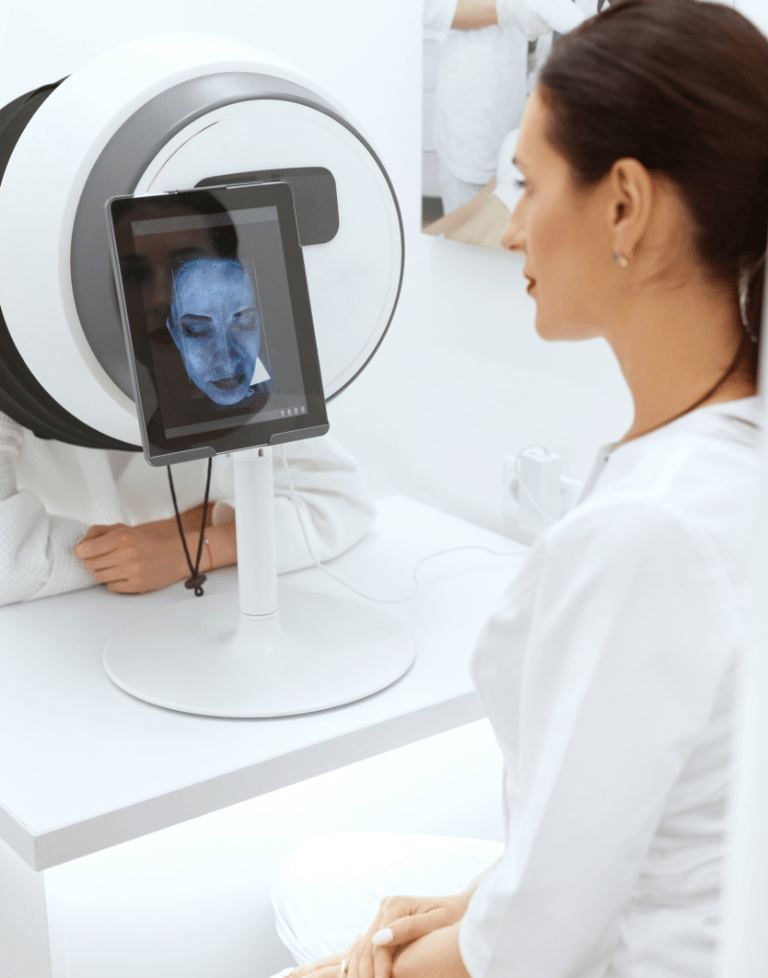

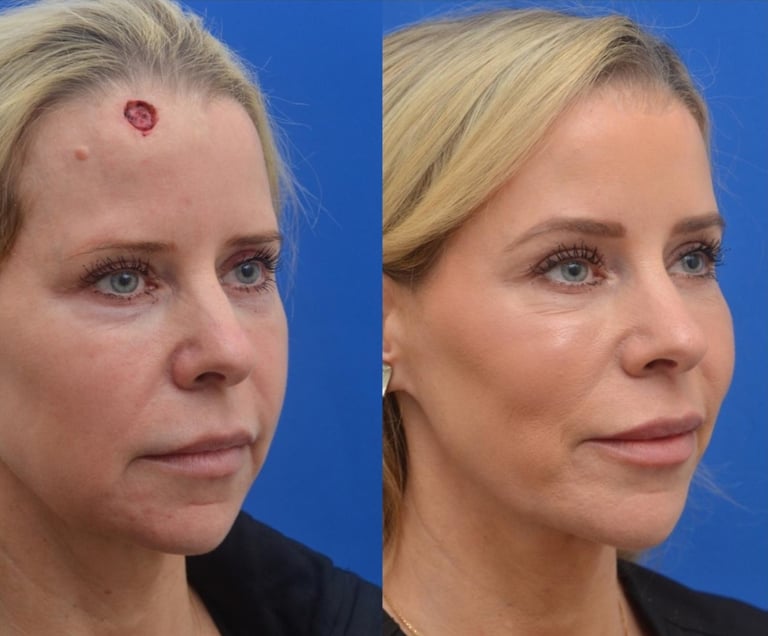

Mohs Surgery for Skin Cancer Treatment
Basal Cell Carcinoma (BCC)
Basal cell carcinoma is the most common form of skin cancer, typically caused by prolonged sun exposure. It often appears as a small, pearly bump or a sore that doesn’t heal. BCC is slow-growing and rarely spreads to other parts of the body, but it can invade surrounding tissues if not treated promptly. Mohs surgery is considered the gold standard for treating BCC, especially in areas like the face, ears, and neck, where preserving as much healthy skin as possible is critical for both function and appearance. The precise nature of Mohs surgery ensures complete removal of cancerous cells while sparing healthy tissue, reducing the risk of recurrence.
Squamous Cell Carcinoma (SCC)
Squamous cell carcinoma is the second most common skin cancer, and it can be more aggressive than BCC. SCC often appears as a firm, red nodule or a flat lesion with a scaly, crusted surface. Unlike BCC, SCC has a higher risk of spreading to other parts of the body, making early detection and treatment crucial. Mohs surgery is especially effective for SCC when the cancer is located in high-risk areas like the face, ears, lips, or around the eyes, where surgical precision is needed. The procedure ensures that the entire tumor is removed, helping to minimize the risk of further complications and recurrence.
Melanoma and Rare Skin Cancers
While Mohs surgery is primarily used for treating basal cell and squamous cell carcinomas, it can also be used in some cases of melanoma, particularly for recurrent melanoma or when the cancer is located in difficult-to-treat areas. Melanoma is a much more aggressive form of skin cancer and can spread rapidly if not detected early. Mohs surgery may not be the first-line treatment for melanoma, but it is sometimes recommended for thin melanomas or when conventional surgery may not provide the precision needed to completely remove cancerous cells. Additionally, Mohs can be effective for rare or unusual skin cancers that are harder to treat with traditional methods. Your surgeon will determine the best approach based on the specific characteristics of the cancer and the patient's individual health needs.
Mohs surgery is an ideal treatment option for various types of skin cancer, offering high success rates and the ability to preserve healthy tissue, making it especially effective for cancers that occur in sensitive or cosmetically important areas. By removing skin cancer with precision and care, Mohs surgery helps ensure both effective treatment and an optimal cosmetic result.


Benefits of Choosing a Mohs Surgeon Serving Vickery Meadow Dallas
Expertise and Experience
When selecting a Mohs surgeon near Vickery Meadow, one of the most important factors to consider is their expertise and experience in performing the procedure. Mohs surgeons are highly trained and board-certified dermatologists who specialize in the precise removal of skin cancer. Their extensive experience allows them to handle complex cases, such as those involving skin cancer in delicate areas like the face, ears, and neck. By choosing a skilled Mohs surgeon in the Vickery Meadow area, patients can have confidence that they are receiving the highest level of care for their skin cancer treatment. Surgeons with experience in Mohs surgery have the knowledge to ensure the best possible outcomes, minimizing the risk of recurrence and ensuring optimal cosmetic results.
Advanced Technology and Techniques
Mohs surgery relies on state-of-the-art technology and techniques to remove skin cancer with precision. Mohs surgeons Vickery Meadow, utilize advanced tools like specialized microscopes to examine tissue layers during surgery, ensuring that all cancerous cells are identified and removed. This technology is essential in providing the highest success rates and the least amount of tissue removal, allowing for faster healing and a better cosmetic outcome. In addition, many Mohs surgeons Vickery Meadow incorporate the latest advancements in wound closure, helping to ensure minimal scarring and optimal skin repair after the surgery. By choosing a surgeon who stays up-to-date with the latest technological advancements, you can be confident that you’re receiving cutting-edge care for your skin cancer treatment.
Local, Personalized Care
Choosing a Mohs surgeon Vickery Meadow, offers the added benefit of receiving local, personalized care that is tailored to your unique needs. Local surgeons are familiar with the specific health concerns of the community and can provide individualized treatment plans that cater to your skin type, medical history, and personal preferences. By selecting a local specialist, you also benefit from the convenience of being treated close to home, which can make scheduling follow-up appointments easier and reduce the stress of traveling long distances for treatment. Personalized care ensures that you feel comfortable, well-informed, and supported throughout the entire process, from your initial consultation to post-surgery recovery. Whether you are undergoing Mohs surgery for basal cell carcinoma, squamous cell carcinoma, or other skin cancers, a local Mohs surgeon Vickery Meadow will work closely with you to ensure the best possible treatment and outcome.
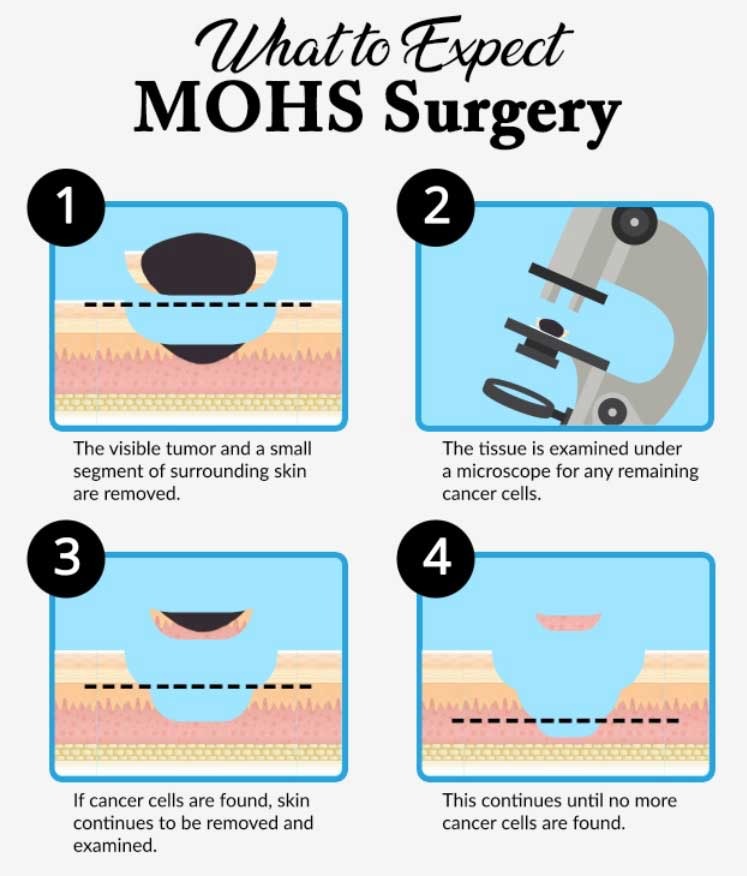

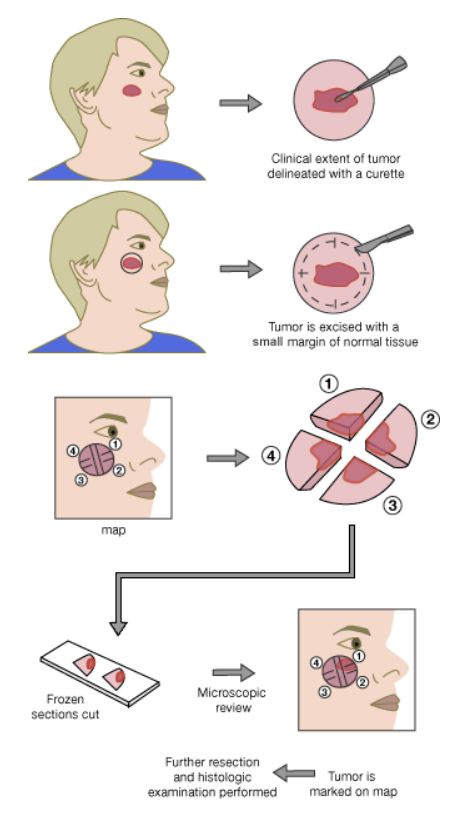

Preparing for Your Mohs Surgery
Pre-operative Instructions
Preparing for your Mohs surgery involves following specific instructions to ensure the procedure goes smoothly and effectively. Your Mohs surgeon Vickery Meadow, will provide you with a detailed set of pre-operative guidelines, but here are some common steps:
Medication Adjustments: If you take blood thinners or other medications, your surgeon may advise you to stop taking them for a certain period before the surgery to minimize the risk of bleeding. Be sure to inform your surgeon about any prescription or over-the-counter medications, vitamins, or supplements you're taking.
Avoiding Smoking: Smoking can impair wound healing and increase the risk of complications after surgery. It’s recommended to stop smoking several weeks before and after the procedure to ensure optimal recovery.
Fasting: While Mohs surgery is typically an outpatient procedure with local anesthesia, your surgeon may recommend fasting for a certain period before the surgery if sedation is needed.
Arranging Transportation: Since you may feel groggy or disoriented after the surgery, it's a good idea to arrange for someone to drive you to and from your appointment.
Skin Care: Avoid using makeup, lotions, or perfumes on the day of surgery, as these can interfere with the surgical site and the effectiveness of anesthesia.
Your surgeon will go over any additional personalized instructions during your consultation to ensure you’re fully prepared for the procedure.
What to Expect on the Day of Surgery
On the day of your Mohs surgery, here’s what you can expect:
Arrival and Check-in: You’ll arrive at the surgical facility or office where your Mohs surgery will take place. After checking in, you'll be taken to a private room where you’ll meet your surgeon and surgical team to review your medical history and discuss the procedure one last time.
Anesthesia: Mohs surgery is typically performed using local anesthesia, which numbs the area being treated. You’ll remain awake and alert during the procedure, but you shouldn't feel any pain. If you're feeling anxious, your surgeon may offer sedation to help you relax.
Procedure Overview: The surgeon will begin by removing a thin layer of tissue from the area where the skin cancer is located. This layer will be carefully examined under a microscope to ensure that all cancerous cells have been removed. If necessary, additional layers of tissue will be taken until the cancer is completely excised.
Recovery Area: After the removal of the cancerous tissue, you will be taken to a recovery area where the surgical site will be bandaged. The surgery can take several hours, depending on the size and location of the skin cancer, so be prepared for a few hours at the facility.
Post-surgery Care: Once the procedure is complete, you will receive instructions on how to care for your wound and schedule any necessary follow-up appointments to monitor healing.
By following your surgeon’s pre-operative instructions and understanding what to expect on the day of surgery, you can ensure that your Mohs procedure goes smoothly and you’re on your way to a successful recovery.
Recovery and Aftercare Tips
Wound Care Guidance
After your Mohs surgery, proper wound care is essential to promote healing and prevent infection. Here are some general wound care tips to follow:
Keep the Surgical Site Clean: Gently clean the area around the surgical site with mild soap and water. Avoid scrubbing the wound to prevent irritation. Your surgeon will provide specific instructions on how to clean the area depending on the nature of your wound.
Apply Medications as Directed: Your surgeon may prescribe an antibiotic ointment to prevent infection, or a healing ointment to support the tissue repair process. Follow the instructions carefully to ensure the best outcome.
Dressings and Bandages: Keep any dressings or bandages on the surgical site as instructed by your surgeon. Be sure to change them as directed, and never remove them too early. If the bandage becomes wet or dirty, replace it promptly.
Avoid Scratching or Rubbing: It can be tempting to scratch or rub the area as it heals, but doing so may cause irritation, delay healing, or increase the risk of infection. Avoid touching the site unless you are cleaning or applying prescribed ointment.
Follow-up Appointments
Follow-up appointments are crucial to monitor your recovery and ensure that the surgical site is healing properly. These appointments typically occur within a few days to a week after your Mohs surgery. During these visits, your surgeon will:
Check for Signs of Infection: Your surgeon will inspect the site for any signs of infection, such as redness, swelling, or unusual drainage. If you experience any of these symptoms, be sure to notify your surgeon immediately.
Evaluate Healing: Your surgeon will assess how well the wound is healing and may remove stitches or change the dressing, depending on your specific case.
Discuss Additional Treatments: If necessary, follow-up appointments may also involve discussing any additional treatments or procedures that may be needed to finalize your skin cancer treatment or enhance the healing process.
It’s important to attend all follow-up appointments to ensure your wound heals properly and to catch any potential issues early.
Managing Scars and Healing
While Mohs surgery is designed to minimize tissue removal and optimize cosmetic outcomes, some scarring is inevitable, especially if the procedure is performed in more delicate areas like the face. However, with proper care, most scars will fade and become less noticeable over time. Here are some tips to manage scars and promote healing:
Stay Out of the Sun: Exposure to sunlight can darken scars and make them more noticeable. Protect the surgical site by wearing sunscreen (SPF 30 or higher) or covering the area with clothing when outdoors, especially during the first few months after surgery.
Moisturize: Keep the surgical site moisturized to promote healing and reduce scarring. Your surgeon may recommend a specific healing ointment or cream to use during the recovery process.
Avoid Smoking: Smoking can slow the healing process and lead to poor scar formation. Avoid smoking during your recovery to improve the healing of your wound and reduce the appearance of scars.
Massage the Area: After your wound has healed, your surgeon may recommend gentle massage techniques to help break down scar tissue and encourage a smoother appearance.
Patience is Key: Healing from Mohs surgery takes time. Most scars will soften and fade over the course of several months. If you're concerned about the appearance of your scar, your surgeon can discuss options such as scar revision treatments or other cosmetic procedures.
By following these recovery and aftercare tips, you can help ensure a smooth healing process and minimize the appearance of scars, allowing you to enjoy the long-term benefits of successful skin cancer treatment.
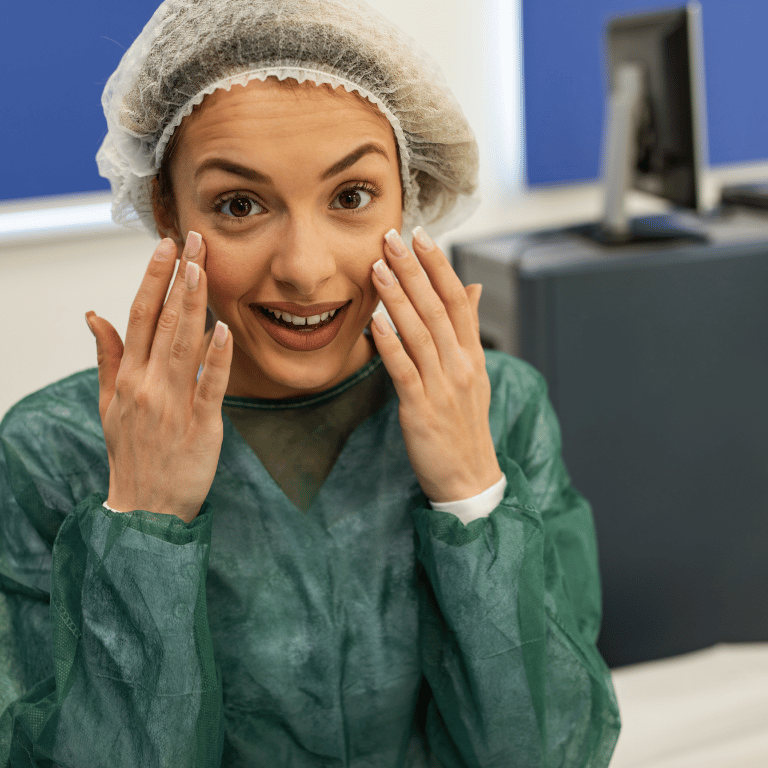



Frequently Asked Questions (FAQs)
About Mohs Surgery
How long does Mohs surgery take?
The duration of Mohs surgery varies depending on the size, location, and complexity of the skin cancer being treated. On average, the procedure can take anywhere from one to several hours. This is because the surgeon must remove the cancerous tissue layer by layer, examining each layer under a microscope until all cancer cells have been removed. If additional layers are required, the surgery may take longer. It's important to allow for the entire process, which may include waiting for the tissue analysis between each stage. Your surgeon will provide an estimate of the time involved based on your specific case.
Will it leave a scar?
As with any surgery, Mohs surgery will leave a scar, though the extent of scarring varies depending on the size and location of the skin cancer. One of the key benefits of Mohs surgery is that it removes only the cancerous tissue, preserving as much healthy tissue as possible, which can help minimize the appearance of scarring. Most scars tend to fade and improve in appearance over time. If you're concerned about scars, your surgeon can recommend post-operative care and treatments that can aid in healing and reduce scar visibility.
What are the risks involved?
Mohs surgery is generally considered safe, but as with any surgical procedure, there are some risks to be aware of. These include:
Infection: Though rare, there is a small risk of infection at the surgical site. It's essential to follow all post-surgery care instructions to reduce this risk.
Bleeding: Some bleeding during and after the procedure is common, but it is usually controlled during the surgery. However, if excessive bleeding occurs, your surgeon will take steps to manage it.
Scarring: While the goal of Mohs surgery is to minimize scarring, there is still the possibility of visible scarring, especially if the cancer was located in a delicate area or required multiple tissue layers to be removed.
Recurrence: In rare cases, cancer cells may remain after the surgery, requiring additional treatments or procedures. However, the success rate of Mohs surgery in completely removing skin cancer is very high.
How painful is Mohs surgery?
Mohs surgery is typically performed using local anesthesia, which numbs the treatment area. Most patients report feeling little to no pain during the procedure itself. You may feel some pressure or a slight tugging sensation as the tissue is removed, but it should not be painful. After the anesthesia wears off, you might experience mild discomfort, which can usually be managed with over-the-counter pain relievers. Your surgeon will provide pain management guidance to ensure you remain as comfortable as possible during recovery.
Can I drive myself home after the procedure?
In most cases, patients are awake and alert after Mohs surgery and can drive themselves home. However, if you were given any sedatives or if the surgery was performed on a particularly sensitive area (such as the face), you may want to arrange for someone to drive you home to ensure your safety. Your surgeon will provide personalized advice based on your procedure.
What happens if the skin cancer is not completely removed during surgery?
In the rare event that all cancerous cells are not removed during the first round of Mohs surgery, the surgeon will continue to remove additional layers of tissue until the cancer is completely excised. The surgical team will carefully examine each layer under a microscope to ensure no cancer cells remain, providing a high success rate in removing the cancer.
Can Mohs surgery be performed on all types of skin cancer?
Mohs surgery is primarily used to treat non-melanoma skin cancers, such as basal cell carcinoma and squamous cell carcinoma. It can also be effective for treating some types of melanoma and rare skin cancers. However, not all skin cancers are suitable for Mohs surgery. Your surgeon will assess your specific case and determine whether this approach is appropriate based on the type, size, and location of the cancer.
What should I avoid after Mohs surgery?
To ensure optimal healing after your surgery, avoid the following:
Sun exposure: Direct sunlight can interfere with healing and increase the visibility of scars. Always apply sunscreen (SPF 30 or higher) and wear protective clothing when going outdoors.
Strenuous activity: Refrain from heavy exercise or activities that may cause sweating, which can irritate the wound and delay healing.
Smoking: Smoking can slow the healing process and increase the risk of complications. It’s advised to avoid smoking during your recovery.
Can Mohs surgery be done on large areas of skin cancer?
Yes, Mohs surgery can be performed on larger areas of skin cancer. However, larger areas may require more extensive surgery and a longer recovery period. Your surgeon will discuss the treatment plan in detail and provide expectations based on the size and location of the skin cancer.
What are the alternatives to Mohs surgery?
While Mohs surgery is one of the most effective methods for treating skin cancer, there are other treatment options, depending on the type and stage of cancer. These include:
Excisional surgery: A traditional surgical method to remove the cancerous tissue.
Cryotherapy: Freezing of the cancerous cells.
Radiation therapy: Targeting cancer cells with radiation.
Topical treatments: Using creams or ointments to treat certain skin cancers.
Your surgeon will help determine the best course of treatment for you based on your individual needs and circumstances.
By addressing these questions, we hope to provide a clear understanding of what to expect with Mohs surgery, its benefits, and the process involved. If you have additional questions, don’t hesitate to reach out to your trusted Mohs surgeon for more information.
Contact Us for Mohs Surgery Vickery Meadow Dallas
If you or a loved one are considering Mohs surgery for skin cancer treatment, don’t wait to get the expert care you deserve. Our team of skilled surgeons Vickery Meadow, are here to guide you through every step of the process, from initial consultation to post-surgery recovery.
With years of experience and a commitment to providing high-quality, personalized care, we are dedicated to ensuring the best possible outcomes for our patients. If you’re ready to take the first step toward safer, healthier skin, contact us today!
Call us or fill out our online form to schedule your consultation. Let us help you achieve the best results with Mohs surgery.
Schedule Your Appointment


Please fill out the form below to reach out to our Vickery Meadow Dermatology team. We’ll get back to you as soon as possible to discuss your needs and help you schedule an appointment.




